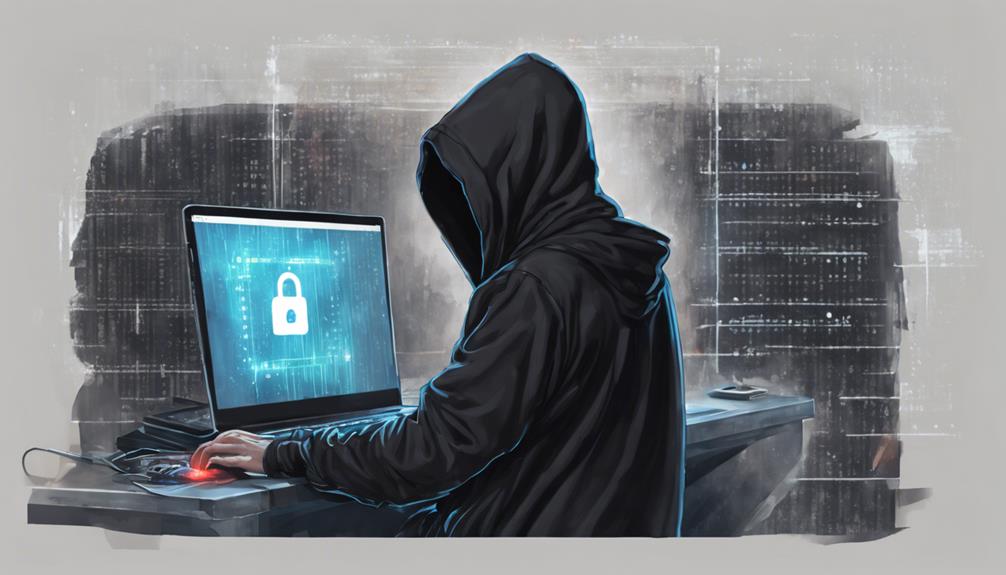Smart TVs are not hacker-proof. Vulnerabilities in software can allow hackers to access personal data. To enhance security, update software, change default settings, and use strong passwords. Signs of hacking include unusual pop-ups and slow performance. Privacy concerns arise from data collection for targeted advertising. Safeguard your smart TV by reviewing privacy policies, updating software, and disconnecting from the internet when not in use. Stay vigilant and take steps to protect your personal information. Understanding these risks is essential.
Key Takeaways
- Smart TVs are vulnerable to hackers due to software weaknesses.
- Regularly update software and firmware to prevent cyber attacks.
- Change default settings, passwords, and disable unused features.
- Monitor network activity for signs of hacking, like pop-up ads.
- Disconnect the TV from the internet to reduce data harvesting risks.
Common Smart TV Vulnerabilities
What are the common vulnerabilities that make smart TVs susceptible to cyber attacks?
Smart TV owners should be aware that these devices can be targeted due to weaknesses in their software and firmware. Hackers may exploit security flaws to access personal data, such as viewing habits, stored on the TV. Additionally, smart TVs often collect data for targeted advertising or other purposes, raising concerns about privacy.
It is important for users to regularly update their devices with security patches and firmware updates to mitigate these risks. Moreover, features like voice recognition and data collection can also be exploited if not properly secured.
Privacy settings and understanding privacy policies related to smart devices are essential for safeguarding personal information. By staying informed and proactive in managing the security of their smart TVs, users can reduce the likelihood of falling victim to cyber attacks and protect their privacy.
Tips to Enhance Smart TV Security

Enhancing the security of smart TVs involves implementing various strategies to safeguard against potential cyber threats and privacy risks. To start, change default security settings, passwords, and disable any unused features to strengthen security measures.
Consider disconnecting the TV from the internet to limit data harvesting and hacking risks. Regularly updating TV software and firmware is essential to protect against vulnerabilities. It is important to use strong passwords, enable firewalls, and avoid automatic connections to prevent unauthorized access to personal information.
Monitoring network activity is key in detecting any suspicious behavior that may indicate hacking attempts. Educating all users about smart TV security risks is important for overall protection. By taking these steps, users can enhance the security of their smart TVs and reduce the likelihood of falling victim to cyber threats.
Recognizing Signs of Smart TV Hacking

To effectively safeguard your smart TV from potential cyber threats, it is important to be able to recognize the signs of hacking that may indicate unauthorized access or compromise of your device's security.
Signs of smart TV hacking can include unexpected pop-up ads, unresponsive remote control, slow performance, unusual network activity, and unfamiliar applications. Cybercriminals may exploit vulnerabilities to access personal data through malware or even spy on users via the TV's webcam.
Indicators of hacking could manifest as sudden changes in settings, unauthorized access to personal data, or unusual network behavior. Stay vigilant for signs such as unauthorized access, suspicious network activity, or any unusual behavior exhibited by your smart TV.
It's essential to monitor your device for signs of hacking, like unusual pop-ups, decreased performance, or alterations in settings, to promptly address any potential security breaches and protect your personal information.
Privacy Concerns With Smart TVS

Amid the rising concerns surrounding smart TVs, privacy issues have become a significant focus due to the collection of personal data for targeted advertising. Smart TVs, manufactured by companies like Samsung, Vizio, and LG, have come under scrutiny for tracking viewing habits to tailor ads, raising worries about data collection practices.
This data harvesting opens up hacking risks, potentially leading to unauthorized access to cameras and microphones, posing security threats to users' personal information.
To address these privacy concerns, users can take steps to safeguard their smart TVs. Disconnecting the device from the internet can limit data collection, while adjusting privacy settings and disabling certain features can enhance security. Additionally, physically covering cameras and microphones when not in use can prevent potential breaches of privacy.
Steps to Safeguard Your Smart TV

Security measures must be implemented to safeguard your Samsung smart TVs from potential privacy risks and hacking threats. Start by reviewing the privacy policy of your TV manufacturer and streaming services to understand how they use your viewing data.
Make sure to set strong passwords and disable features like gesture control if not needed. Additionally, carefully read and accept user agreements to stay informed about data collection practices and ad tracking.
Regularly update your smart TV's software to receive the latest security patches automatically. Change default security settings and passwords, and consider covering the camera with tape if you can't turn it off. Avoid downloading unauthorized apps to prevent security risks.
If possible, disconnect your smart TV from the internet when not in use to limit potential data harvesting and hacking risks. By taking these steps, you can better protect your data and enhance the security of your smart TV.
Frequently Asked Questions
Can Hackers See Me Through My Smart Tv?
Yes, hackers can potentially access smart TV cameras and microphones, enabling unauthorized surveillance. To mitigate this risk, users should consider covering the camera when not in use and implementing cybersecurity best practices to safeguard their privacy.
Are Smart TVS Safe From Hackers?
In today's interconnected world, the security of smart TVs against hackers is a critical concern. Implementing robust security measures, such as regular updates and monitoring for suspicious activity, is essential to safeguard these devices from potential cyber threats.
How Do I Know if My Smart TV Has a Camera?
To identify if your smart TV has a camera, look for a small circular lens on the bezel or indicator lights nearby. Check the user manual or settings for camera details. Cover it with tape for added security if unsure.
Are There Hidden Cameras in Smart Tvs?
Hidden cameras are not typically found in smart TVs. However, built-in cameras in some models can pose privacy risks if exploited by hackers. Users should be cautious, cover cameras when not in use, and stay informed about potential vulnerabilities.
Conclusion
To wrap up, it is crucial to remain vigilant and take proactive steps to safeguard your smart TV from potential hackers. By being aware of common vulnerabilities, enhancing security measures, recognizing signs of hacking, and addressing privacy concerns, you can better protect your device and personal information.
Remember, a secure smart TV is a safe smart TV. Stay informed and take the necessary precautions to guarantee your digital safety.









